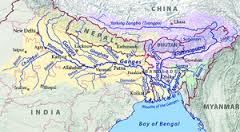Dhaka requests Delhi not to interlink Himalayan rivers
Bangladesh has requested India not to interlink the Himalayan rivers as it would adversely affect its ecology and agro-socio economy.
On Monday, the ministry of water resources in a letter reminded the Indian water resources ministry that any diversion of the waters of the Himalayan rivers would go against India’s commitments to Bangladesh, said a senior official.
He said that the letter was sent through the foreign office.
On July 13,India unilaterally announced its controversial decision to interlink four trans-boundary rivers, the Manas, Sankosh, Teesta and Ganges.
Water resources ministry secretary Zafar Ahmed Khan said India’s decision to interlink the Himalayan rivers as reported in the media was contradictory to India’s commitments to Bangladesh.
He told New Age Wednesday that the water resources ministry requested India not to implement any project to interlink rivers as it would harm Bangladesh.
Bangladesh-India Joint Rivers’ Commission member Mir Sajjad Hossain said India did not inform Bangladesh on the issue until now.
The inter-linking of Himalayan rivers to divert the waters of Brahmaputra and the Ganges would increase intrusion of salinity in Bangladesh and adversely affect its ecology, he said.
The Himalayan component of India’s controversial river interlinking plan envisages construction of storage reservoirs on the main Ganges and the Brahmaputra rivers and their principal tributaries in India and Nepal to use the flows for irrigation and hydro electricity generation.
India planned the Himalayan component as a part of interlinking 30 rivers.
India calls the other part of the interlinking project as its peninsular component.
India’s interlinking the Himalayan rivers would leave Bangladesh dry, said water experts.
On July 13, Indian state minister for water resources Sanwar Lal Jat announced the controversial decision at a meeting of the special committee for interlinking of rivers in Delhi, reported the Times of India.
Updating the committee on the status of the projects for interlining rivers, he said, ‘I hope with all statutory clearance, we will be able to start the actual execution of work on the project by the end of this year.’
Sanwar said that the government of India would soon approach Assam, West Bengal and Bihar to seek their consent for interlinking Manas, Sankosh, Teesta and the Ganges rivers.
Water expert Ainun Nishat described the Indian decision as ‘unfortunate, unjust and unilateral.’
It’s India’s political decision to interlink the trans boundary rivers, he said.
The issue of sharing the waters of the common rivers should be resolved first politically, said Nishat, a former Brac University vice chancellor.
Nishat said India should involve the other basin countries before interlinking Manas and Sankoshi.
Manas is the largest river system of Bhutan and its basin countries also include China and India.
The main tributaries of the Manas originate on the north of the Himalayas.
The Manas flows through Bhutan for 272 km and then through Assam for 104km before it becomes a tributary of the Brahmaputra.
Sankosh rises in northern Bhutan and empties into the Brahmaputra in Assam.
In the Joint Declaration issued from the two capitals on June 7 marking the Indian prime minister’s visit to Bangladesh, Narendra Modi reiterated the earlier commitment that India would not take any unilateral decision on the Himalayan component of their River Interlinking Project which may affect Bangladesh’.
The same declaration said, ‘Prime Minister Modi conveyed that deliberations are underway involving all
stakeholders with regard to conclusion of the Interim Agreements on sharing of waters of Teesta and Feni as soon as possible’.
It also said, ‘the two Prime Ministers recalled Article-2 of the Framework Agreement on Cooperation for Development of 2011 and reiterated their commitment to address the issue of water resources management of common rivers including water sharing, in a holistic manner through common basin management’.
Bangladesh and India share 54 trans-boundary rivers.
In 1996, Bangladesh and India signed an agreement stipulating sharing only the Ganges waters for 30 years.
- See more at: http://newagebd.net/139896/dhaka-requests-delhi-not-to-interlink-himalayan-rivers/#sthash.NA9RKDve.dpuf











